Great discoveries in the digestive system.Diseases of digestive system презентация
Great discoveries in the digestive system.Diseases of digestive system презентация
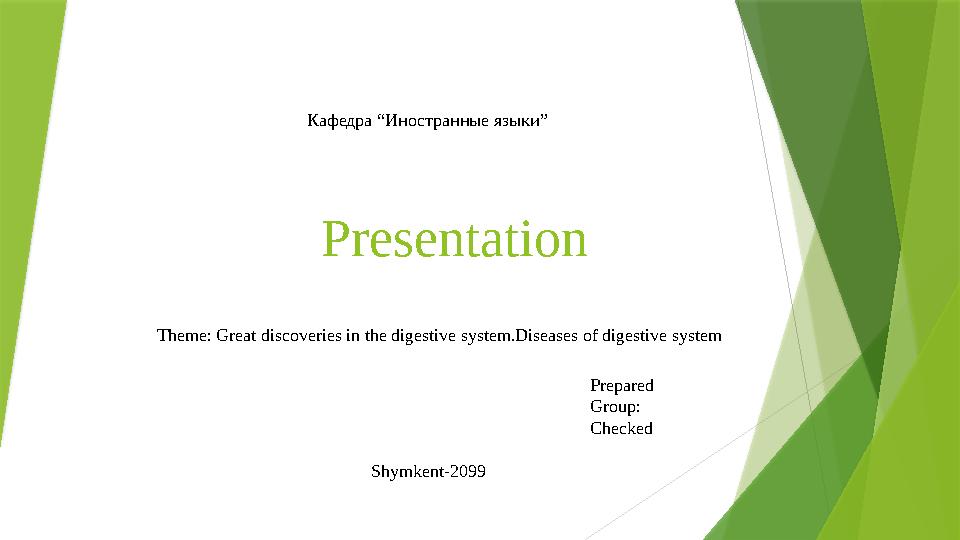

#1 слайд
Presentation
Theme: Great discoveries in the digestive system.Diseases of digestive system Кафедра “Иностранные языки”
Prepared
Group:
Checked
Shymkent-20 99
1 слайд
Presentation Theme: Great discoveries in the digestive system.Diseases of digestive system Кафедра “Иностранные языки” Prepared Group: Checked Shymkent-20 99
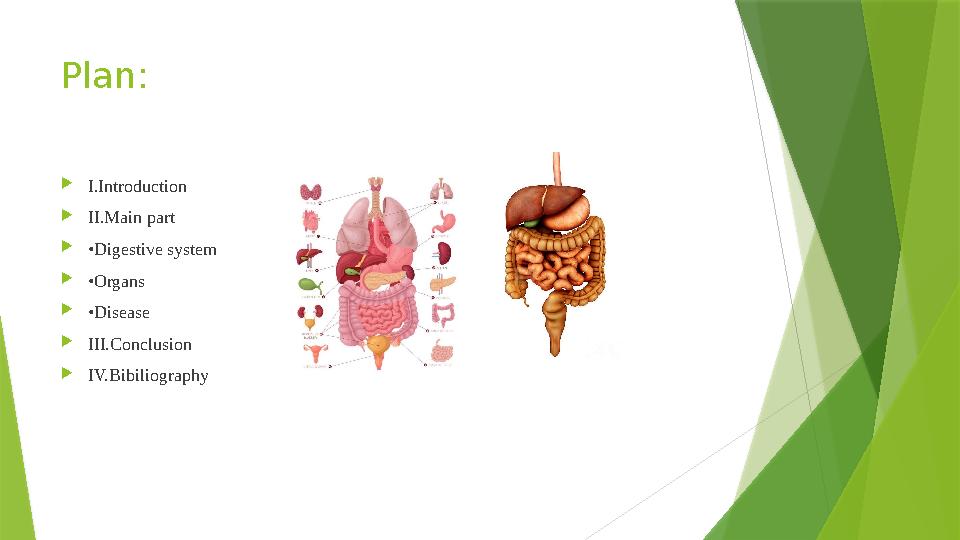
#2 слайд
Plan:
I.Introduction
II.Main part
• Digestive system
• Organs
• Disease
III.Conclusion
IV.Bibiliography
2 слайд
Plan: I.Introduction II.Main part • Digestive system • Organs • Disease III.Conclusion IV.Bibiliography
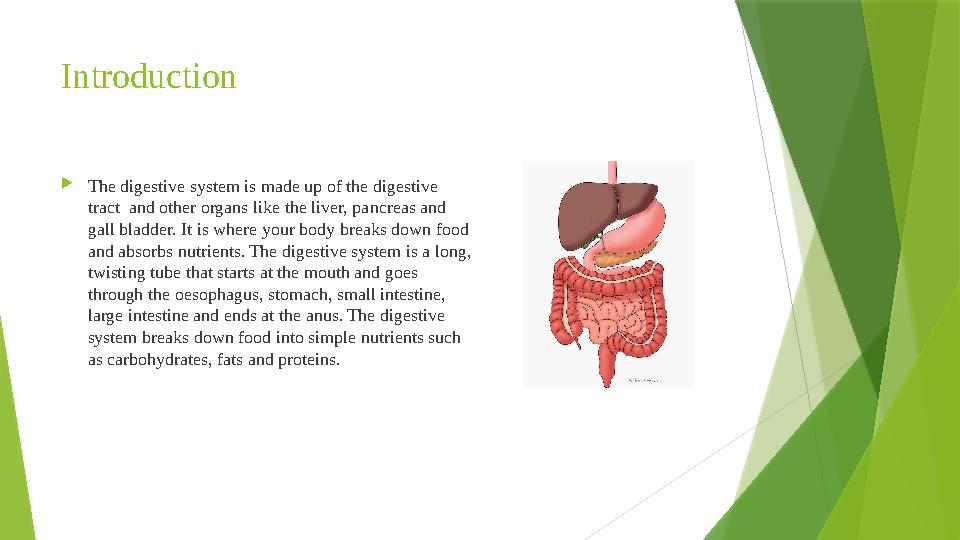
#3 слайд
Introduction
The digestive system is made up of the digestive
tract and other organs like the liver, pancreas and
gall bladder. It is where your body breaks down food
and absorbs nutrients. The digestive system is a long,
twisting tube that starts at the mouth and goes
through the oesophagus, stomach, small intestine,
large intestine and ends at the anus. The digestive
system breaks down food into simple nutrients such
as carbohydrates, fats and proteins.
3 слайд
Introduction The digestive system is made up of the digestive tract and other organs like the liver, pancreas and gall bladder. It is where your body breaks down food and absorbs nutrients. The digestive system is a long, twisting tube that starts at the mouth and goes through the oesophagus, stomach, small intestine, large intestine and ends at the anus. The digestive system breaks down food into simple nutrients such as carbohydrates, fats and proteins.
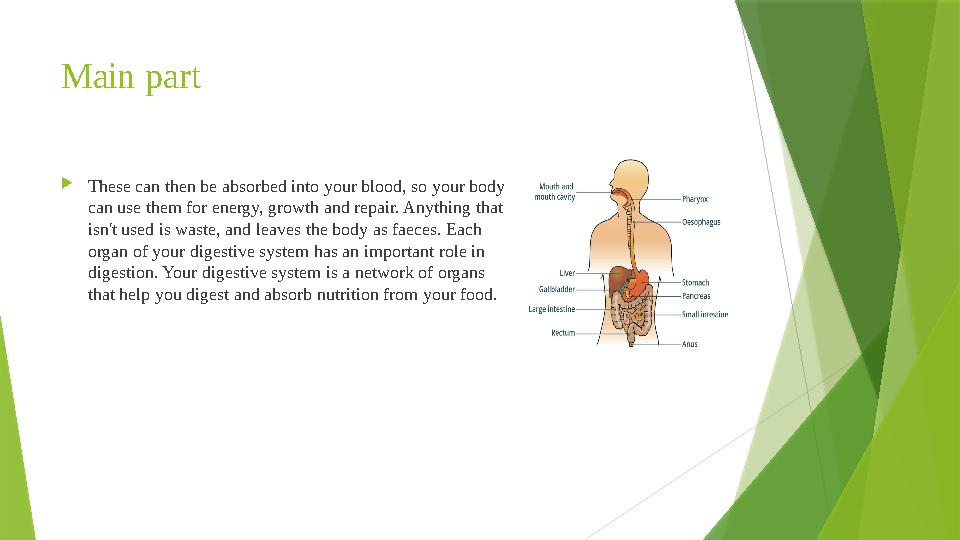
#4 слайд
Main part
These can then be absorbed into your blood, so your body
can use them for energy, growth and repair. Anything that
isn't used is waste, and leaves the body as faeces. Each
organ of your digestive system has an important role in
digestion. Your digestive system is a network of organs
that help you digest and absorb nutrition from your food.
4 слайд
Main part These can then be absorbed into your blood, so your body can use them for energy, growth and repair. Anything that isn't used is waste, and leaves the body as faeces. Each organ of your digestive system has an important role in digestion. Your digestive system is a network of organs that help you digest and absorb nutrition from your food.
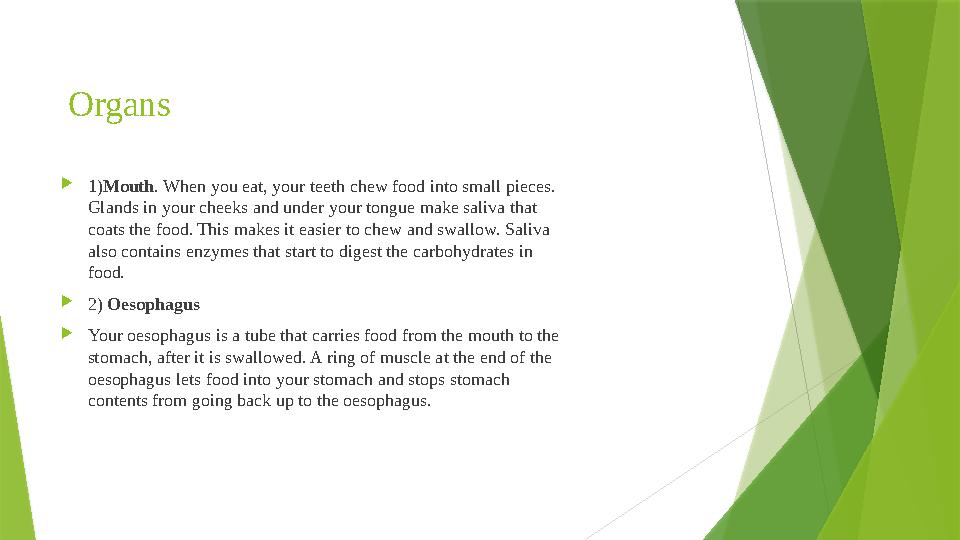
#5 слайд
Organs
1) Mouth . When you eat, your teeth chew food into small pieces.
Glands in your cheeks and under your tongue make saliva that
coats the food. This makes it easier to chew and swallow. Saliva
also contains enzymes that start to digest the carbohydrates in
food.
2) Oesophagus
Your oesophagus is a tube that carries food from the mouth to the
stomach, after it is swallowed. A ring of muscle at the end of the
oesophagus lets food into your stomach and stops stomach
contents from going back up to the oesophagus.
5 слайд
Organs 1) Mouth . When you eat, your teeth chew food into small pieces. Glands in your cheeks and under your tongue make saliva that coats the food. This makes it easier to chew and swallow. Saliva also contains enzymes that start to digest the carbohydrates in food. 2) Oesophagus Your oesophagus is a tube that carries food from the mouth to the stomach, after it is swallowed. A ring of muscle at the end of the oesophagus lets food into your stomach and stops stomach contents from going back up to the oesophagus.
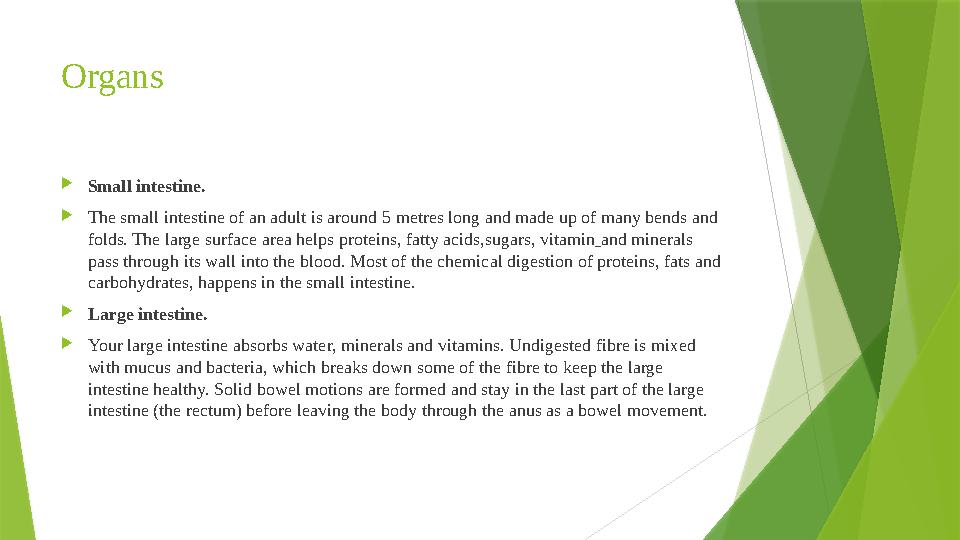
#6 слайд
Organs
Small intestine.
The small intestine of an adult is around 5 metres long and made up of many bends and
folds. The large surface area helps proteins, fatty acids,sugars, vitamin and minerals
pass through its wall into the blood. Most of the chemical digestion of proteins, fats and
carbohydrates, happens in the small intestine.
Large intestine.
Your large intestine absorbs water, minerals and vitamins. Undigested fibre is mixed
with mucus and bacteria, which breaks down some of the fibre to keep the large
intestine healthy. Solid bowel motions are formed and stay in the last part of the large
intestine (the rectum) before leaving the body through the anus as a bowel movement.
6 слайд
Organs Small intestine. The small intestine of an adult is around 5 metres long and made up of many bends and folds. The large surface area helps proteins, fatty acids,sugars, vitamin and minerals pass through its wall into the blood. Most of the chemical digestion of proteins, fats and carbohydrates, happens in the small intestine. Large intestine. Your large intestine absorbs water, minerals and vitamins. Undigested fibre is mixed with mucus and bacteria, which breaks down some of the fibre to keep the large intestine healthy. Solid bowel motions are formed and stay in the last part of the large intestine (the rectum) before leaving the body through the anus as a bowel movement.
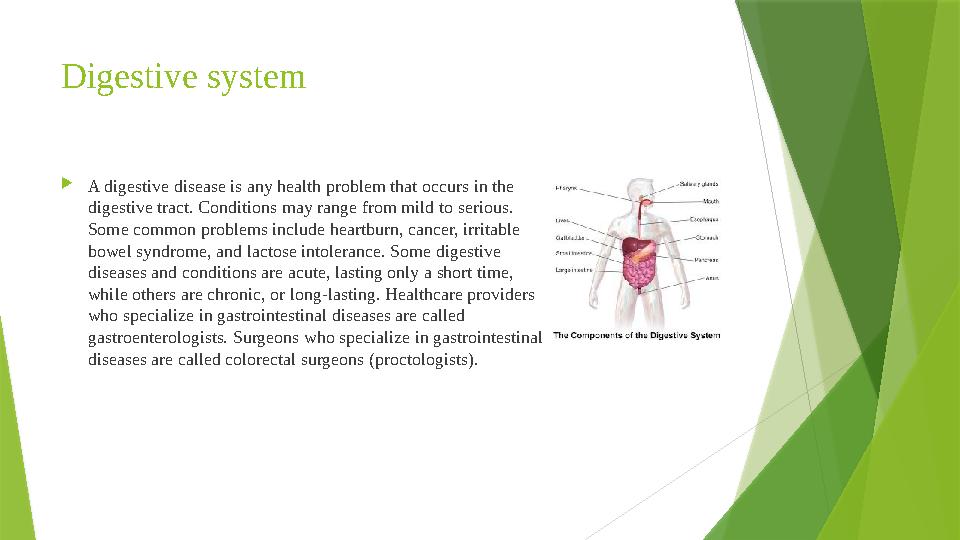
#7 слайд
Digestive system
A digestive disease is any health problem that occurs in the
digestive tract. Conditions may range from mild to serious.
Some common problems include heartburn, cancer, irritable
bowel syndrome, and lactose intolerance. Some digestive
diseases and conditions are acute, lasting only a short time,
while others are chronic, or long-lasting. Healthcare providers
who specialize in gastrointestinal diseases are called
gastroenterologists. Surgeons who specialize in gastrointestinal
diseases are called colorectal surgeons (proctologists).
7 слайд
Digestive system A digestive disease is any health problem that occurs in the digestive tract. Conditions may range from mild to serious. Some common problems include heartburn, cancer, irritable bowel syndrome, and lactose intolerance. Some digestive diseases and conditions are acute, lasting only a short time, while others are chronic, or long-lasting. Healthcare providers who specialize in gastrointestinal diseases are called gastroenterologists. Surgeons who specialize in gastrointestinal diseases are called colorectal surgeons (proctologists).
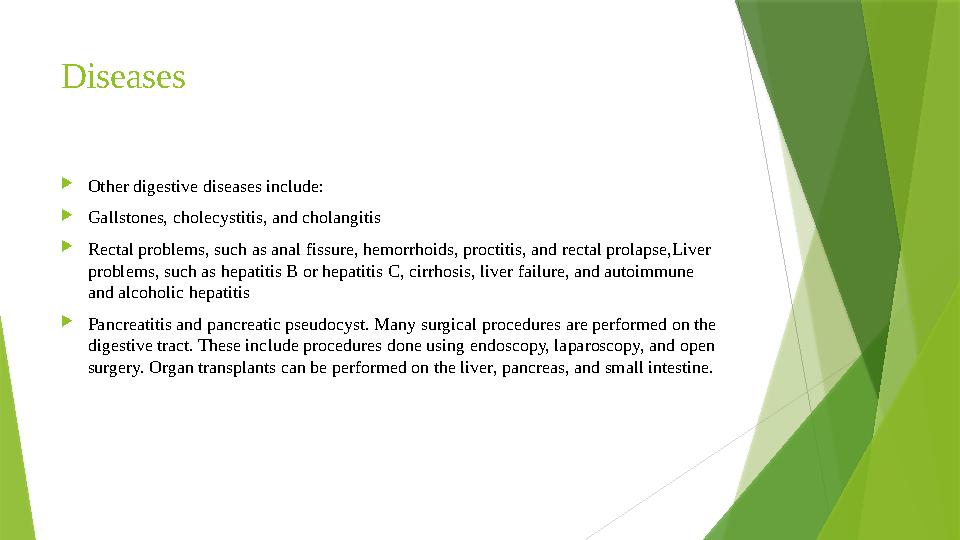
#8 слайд
Diseases
Other digestive diseases include:
Gallstones, cholecystitis, and cholangitis
Rectal problems, such as anal fissure, hemorrhoids, proctitis, and rectal prolapse,Liver
problems, such as hepatitis B or hepatitis C, cirrhosis, liver failure, and autoimmune
and alcoholic hepatitis
Pancreatitis and pancreatic pseudocyst. Many surgical procedures are performed on the
digestive tract. These include procedures done using endoscopy, laparoscopy, and open
surgery. Organ transplants can be performed on the liver, pancreas, and small intestine.
8 слайд
Diseases Other digestive diseases include: Gallstones, cholecystitis, and cholangitis Rectal problems, such as anal fissure, hemorrhoids, proctitis, and rectal prolapse,Liver problems, such as hepatitis B or hepatitis C, cirrhosis, liver failure, and autoimmune and alcoholic hepatitis Pancreatitis and pancreatic pseudocyst. Many surgical procedures are performed on the digestive tract. These include procedures done using endoscopy, laparoscopy, and open surgery. Organ transplants can be performed on the liver, pancreas, and small intestine.
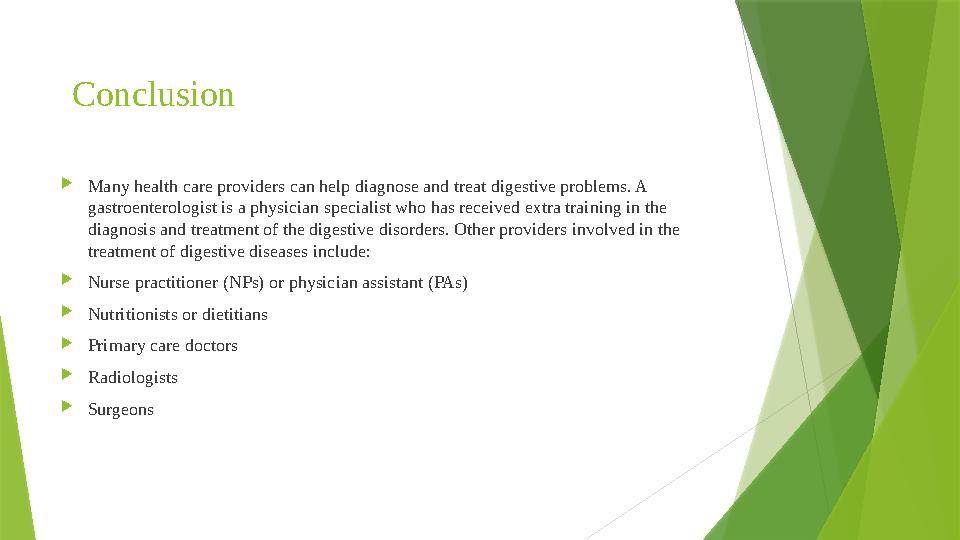
#9 слайд
Conclusion
Many health care providers can help diagnose and treat digestive problems. A
gastroenterologist is a physician specialist who has received extra training in the
diagnosis and treatment of the digestive disorders. Other providers involved in the
treatment of digestive diseases include:
Nurse practitioner (NPs) or physician assistant (PAs)
Nutritionists or dietitians
Primary care doctors
Radiologists
Surgeons
9 слайд
Conclusion Many health care providers can help diagnose and treat digestive problems. A gastroenterologist is a physician specialist who has received extra training in the diagnosis and treatment of the digestive disorders. Other providers involved in the treatment of digestive diseases include: Nurse practitioner (NPs) or physician assistant (PAs) Nutritionists or dietitians Primary care doctors Radiologists Surgeons
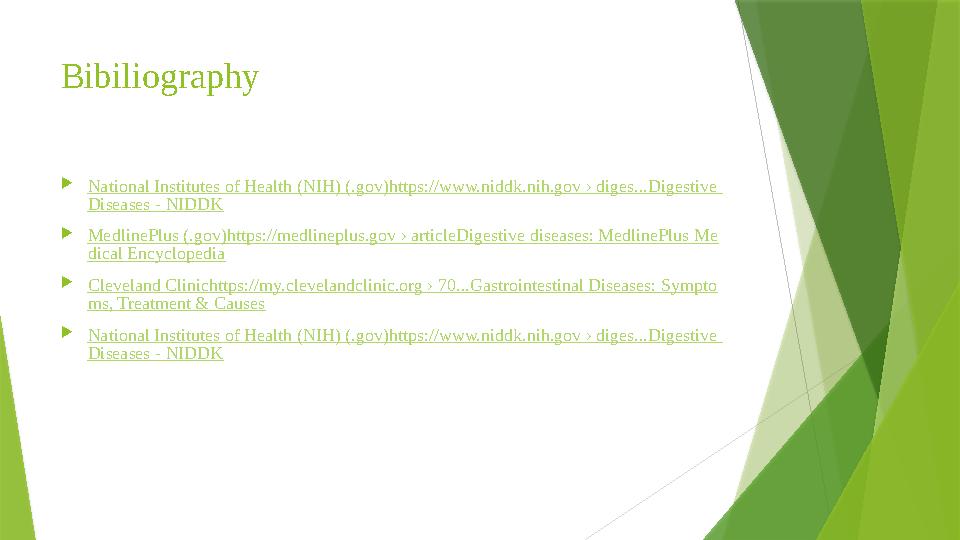
#10 слайд
Bibiliography
National Institutes of Health (NIH) (.gov)https://www.niddk.nih.gov › diges...Digestive
Diseases - NIDDK
MedlinePlus (.gov)https://medlineplus.gov › articleDigestive diseases: MedlinePlus Me
dical Encyclopedia
Cleveland Clinichttps://my.clevelandclinic.org › 70...Gastrointestinal Diseases: Sympto
ms, Treatment & Causes
National Institutes of Health (NIH) (.gov)https://www.niddk.nih.gov › diges...Digestive
Diseases - NIDDK
10 слайд
Bibiliography National Institutes of Health (NIH) (.gov)https://www.niddk.nih.gov › diges...Digestive Diseases - NIDDK MedlinePlus (.gov)https://medlineplus.gov › articleDigestive diseases: MedlinePlus Me dical Encyclopedia Cleveland Clinichttps://my.clevelandclinic.org › 70...Gastrointestinal Diseases: Sympto ms, Treatment & Causes National Institutes of Health (NIH) (.gov)https://www.niddk.nih.gov › diges...Digestive Diseases - NIDDK

шағым қалдыра аласыз
















